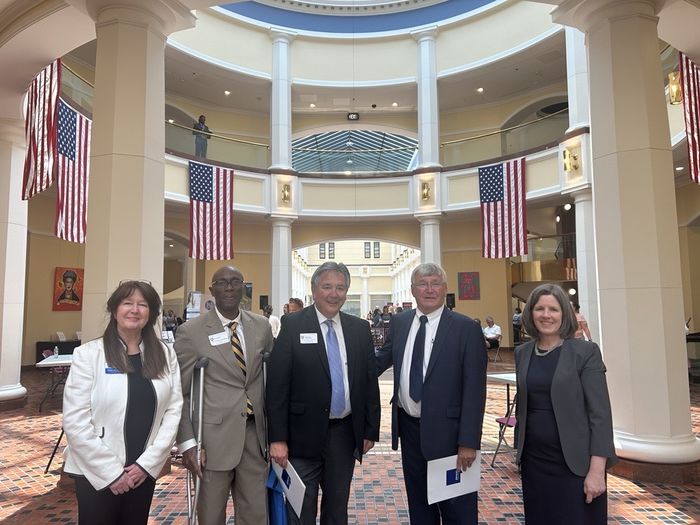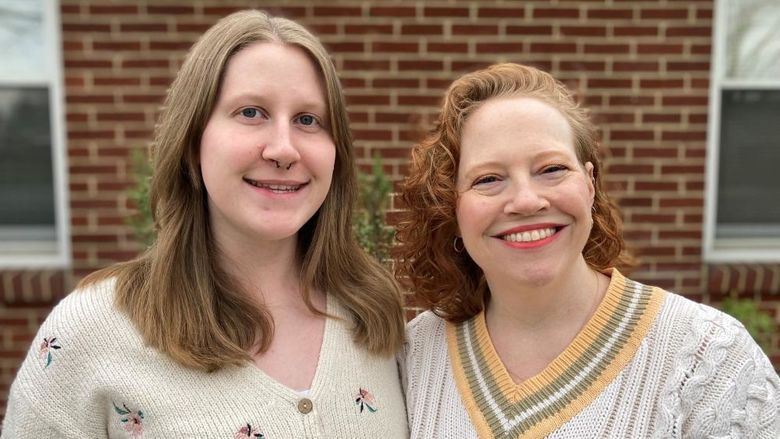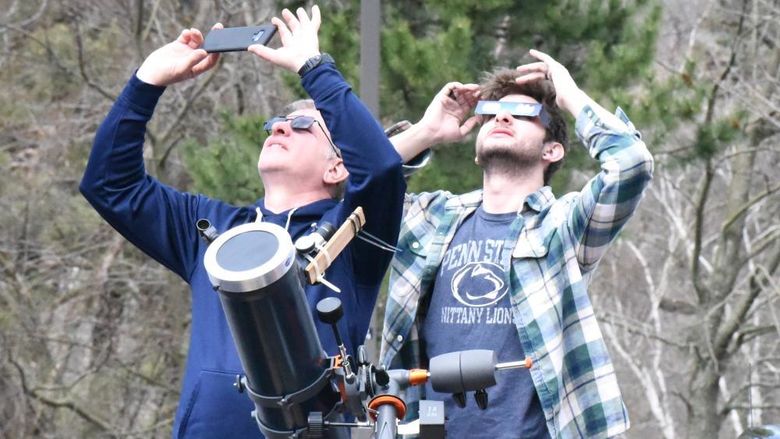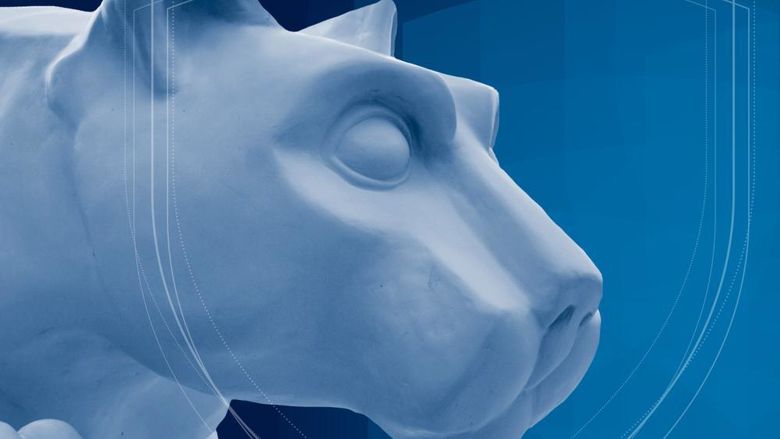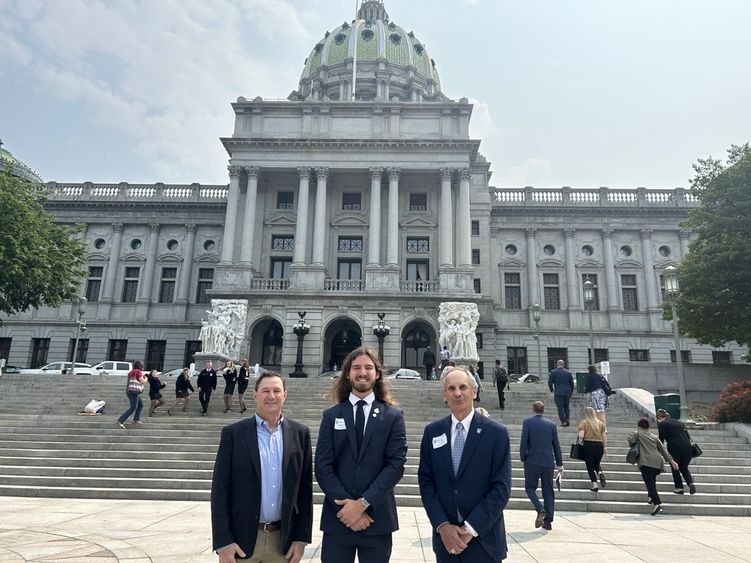
Penn State Commonwealth Campus chancellors, guests and students met with state legislators in Harrisburg on June 6 to advocate for increased state funding for Penn State and its students. Pictured, from left to right, are Matt Tunnel, vice chair of the Penn State Harrisburg Board of Advisers; Fabian Vantassell, Penn State Harrisburg Student Government Association president; and John Mason, chancellor of Penn State Harrisburg.
HARRISBURG, Pa. — Penn State Commonwealth Campus chancellors and supporters took to the state Capitol on June 6 to meet with their elected officials and other state government officials to showcase the impact of the University’s campuses on local communities across Pennsylvania and advocate for increased state funding for the University.
“It is important that our elected officials hear from these chancellors who are both campus leaders and influential figures within their communities,” said Zack Moore, Penn State vice president for government and community relations. “Their advocacy is vital to convey the influence their campus has in fostering social and economic growth in their region.”
Chancellors and campus representatives were advocating for the University’s general support funding, which allows Penn State to offer a significant discount on in-state tuition. At Penn State’s 20 Commonwealth Campuses, nearly 80% of the student body is comprised of Pennsylvania residents who benefit from this investment.
The University’s Commonwealth Campus structure is unique in higher education, as it extends Penn State’s land-grant mission as one university geographically distributed throughout the commonwealth, allowing Penn State to educate more Pennsylvanians than any other single entity in the state.
“Our Commonwealth Campuses represent Penn State’s land-grant mission in action and carry the promise of an accessible and affordable Penn State education to all corners of Pennsylvania,” said Penn State President Neeli Bendapudi. “Through a shared commitment to academic excellence, economic development, outreach and service to local communities, our Commonwealth Campuses are truly one of Penn State’s greatest strengths.”
With a location within 30 miles of 96% of Pennsylvanians, the Commonwealth Campuses are at the heart of Penn State’s commitment to providing an affordable pathway to a world-class education that is within practical commuting distance for the majority of the state’s population. Commonwealth Campus students are more likely to be first-generation college students (nearly 40%), come from underrepresented groups (30%), and receive federal Pell grants (32%) than the broader University student body.
“There’s nothing more powerful than an education that also provides a wealth of opportunities like internships, study abroad programs, community engagement, and research opportunities,” said Tina Richardson, chancellor of Penn State Lehigh Valley. “The Lehigh Valley campus is important to our community because it allows higher education to be more accessible and affordable to the families in our neighborhood.”
Cade Brandon, president of the Penn State Lehigh Valley Student Government Association, joined Richardson at the Capitol and echoed her sentiment about the wealth of opportunities available at Commonwealth Campuses.
“I'm thankful I was able to take advantage of so many opportunities,” said Brandon. “I was in study aboard, I’m conducting research right now, and I serve as the student government president. I don’t think I would have had those immediate opportunities as a first-year student at other universities, while making connections with teachers for even more growth.”
While many students stay at one campus all four years to earn their degree, students can complete the first two years of more than 275 majors at a Commonwealth Campus through the University’s 2+2 Plan before transitioning to University Park or another campus to complete their degree. The Commonwealth Campuses confer almost 5,000 degrees annually and currently enroll approximately 25,000 students in associate, baccalaureate and graduate degree programs. More than 468,000 Penn State alumni have attended a Commonwealth Campus.
Penn State’s Commonwealth Campuses are major centers of education, culture and employment in communities across Pennsylvania. In addition to making higher education possible for thousands of Pennsylvanians, the campuses also employ approximately 6,000 full- and part-time faculty and staff, and they provide public access to things like continuing education courses and trainings; arts, entertainment, lectures and athletics; and Penn State Extension services.
“Access to affordable education is paramount, but we’re also proud of our community engagement,” said Margo DelliCarpini, chancellor of Penn State Abington. “We have a real ability to impact our communities in very meaningful ways. All of our campuses engage in economic development, workforce development, and community engagement that meet the specific needs of our own communities.”
Overall, Penn State’s statewide economic impact is more than $11.6 billion, and with 24 total campus locations, the University’s economic contributions are spread into communities in all corners of Pennsylvania, in a way that is unmatched by any other university in the commonwealth.
The campuses extend training opportunities to local businesses and support workforce development and job creation. Invent Penn State and its 21-location LaunchBox and Innovation Network is a driving force behind the University's modern land-grant mission, which is focused on helping to fuel economic growth and prosperity. These community resource centers have direct ties to the Commonwealth Campuses and work to drive Pennsylvania’s economy by providing entrepreneurs with the resources and mentorship to turn innovative ideas into new businesses.
“Our LaunchBox is special to our community because it has a built-in makerspace that is open to the public,” said Jungwoo Ryoo, chancellor of Penn State DuBois. “In our area there is a lot of manufacturing, so we are in a position to welcome these local companies to take advantage of our Idea Lab and explore emerging technologies in their industry.”
The day of advocacy in Harrisburg gave chancellors and campus representatives the opportunity to emphasize the importance of fair funding for Penn State. This follows the support showcased by the entire Penn State community during the Capital Day campaign, which garnered more than 6,700 advocates who sent over 13,200 messages to the Pennsylvania General Assembly and Gov. Josh Shapiro.
In his inaugural budget address, Shapiro proposed a 7.1% increase to Penn State’s general support funding, which allows the University to provide an in-state tuition rate that saves the average Pennsylvania resident more than $13,000 annually compared to a nonresident student.
The proposal falls short of the 47.6% increase requested by the University for its 2023-24 general support funding — a request designed to place Penn State on equal financial footing with Pennsylvania’s other public universities. Penn State receives the lowest funding in the state on a per-student basis, lagging behind the commonwealth’s other public institutions between $2,600 and $3,400 per Pennsylvania resident student.
Penn State’s funding will require the approval of the General Assembly as lawmakers work to pass a final state budget later this month.
